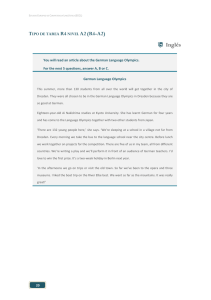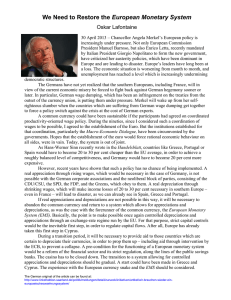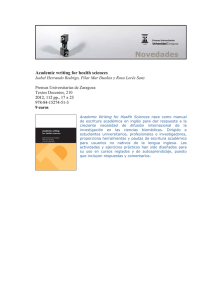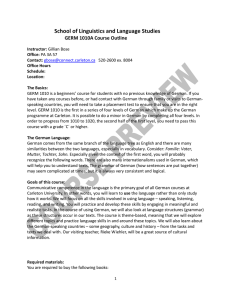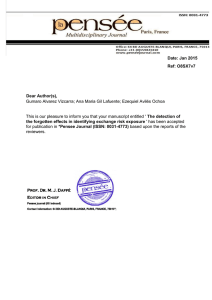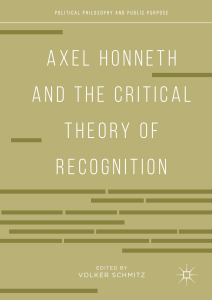Interview with Axel Goodbody
Anuncio
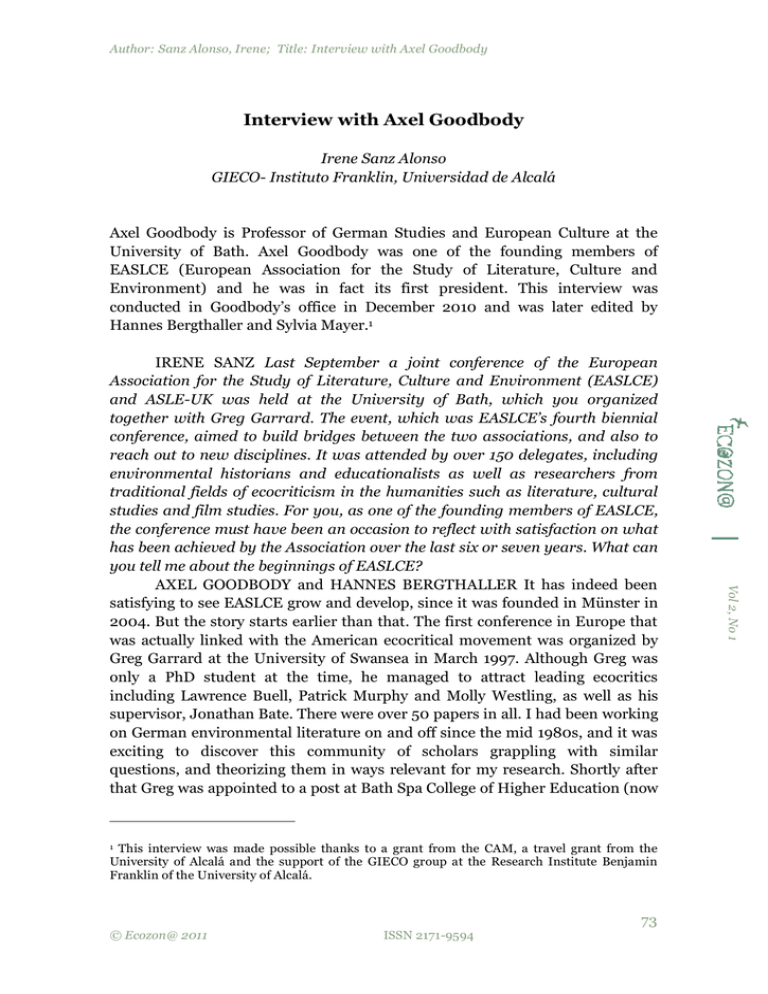
Author: Sanz Alonso, Irene; Title: Interview with Axel Goodbody Interview with Axel Goodbody Irene Sanz Alonso GIECO- Instituto Franklin, Universidad de Alcalá Axel Goodbody is Professor of German Studies and European Culture at the University of Bath. Axel Goodbody was one of the founding members of EASLCE (European Association for the Study of Literature, Culture and Environment) and he was in fact its first president. This interview was conducted in Goodbody’s office in December 2010 and was later edited by Hannes Bergthaller and Sylvia Mayer.1 This interview was made possible thanks to a grant from the CAM, a travel grant from the University of Alcalá and the support of the GIECO group at the Research Institute Benjamin Franklin of the University of Alcalá. 1 73 © Ecozon@ 2011 ISSN 2171-9594 Vol 2, No 1 IRENE SANZ Last September a joint conference of the European Association for the Study of Literature, Culture and Environment (EASLCE) and ASLE-UK was held at the University of Bath, which you organized together with Greg Garrard. The event, which was EASLCE’s fourth biennial conference, aimed to build bridges between the two associations, and also to reach out to new disciplines. It was attended by over 150 delegates, including environmental historians and educationalists as well as researchers from traditional fields of ecocriticism in the humanities such as literature, cultural studies and film studies. For you, as one of the founding members of EASLCE, the conference must have been an occasion to reflect with satisfaction on what has been achieved by the Association over the last six or seven years. What can you tell me about the beginnings of EASLCE? AXEL GOODBODY and HANNES BERGTHALLER It has indeed been satisfying to see EASLCE grow and develop, since it was founded in Münster in 2004. But the story starts earlier than that. The first conference in Europe that was actually linked with the American ecocritical movement was organized by Greg Garrard at the University of Swansea in March 1997. Although Greg was only a PhD student at the time, he managed to attract leading ecocritics including Lawrence Buell, Patrick Murphy and Molly Westling, as well as his supervisor, Jonathan Bate. There were over 50 papers in all. I had been working on German environmental literature on and off since the mid 1980s, and it was exciting to discover this community of scholars grappling with similar questions, and theorizing them in ways relevant for my research. Shortly after that Greg was appointed to a post at Bath Spa College of Higher Education (now Author: Sanz Alonso, Irene; Title: Interview with Axel Goodbody 74 © Ecozon@ 2011 ISSN 2171-9594 Vol 2, No 1 Bath Spa University), where he co-organized another ecocritical conference (June 1998) together with Richard Kerridge. Again the programme was mainly focused on American and English literature and literary theory, but I met some people there who were working in German (the Australian Kate Rigby and the Lancaster historian Thomas Rohkrämer). ASLE-UK was founded at a meeting during the conference. Over the next few years, Terry Gifford convened a number of one-day ASLE-UK symposia at Bretton Hall in Yorkshire, and I served as Treasurer up to 2004. I put together a panel on German writing at the second ASLE-UK conference, which John Parham organized at the University of East London in September 2000, and there were papers on German subjects again at the next ASLE-UK conference, which Terry hosted at Bretton Hall in 2002. Val Plumwood and Leo Marx were keynote speakers, and the event attracted a range of researchers from European countries as well as the UK and the USA. At the time I was working on a 3-year project “Nature and Environment in Modern German Literature”, which was led by Colin Riordan, Professor of German at the University of Newcastle. Colin had been one of the organizers of a conference on Ecological Thought in German Culture back in 1995, but neither he nor I was aware of the existence of ecocriticism as a critical approach at the time. The NEMG project provided funds for visits to archives in Germany, and enabled me to organize a small conference on German environmental literature at the University of Bath together with Colin and Simon Meacher. Since then, ecocriticism has been the main focus of my research. But, coming back to EASLCE, it was at the Bretton Hall conference that the idea of the Association was born. Hannes Bergthaller, who was writing a PhD in Bonn on American literature and the environmental movement, floated the idea of founding an ASLE-Germany, and we corresponded about this over the next few months. I was keen that the organization should include scholars working on German literature, as well as the people like Hannes, living in Germany and writing on American and British texts. Hannes persuaded his Head of Department to allow him to host a meeting of a steering group at the University of Bonn. He invited people he knew were interested in ecocriticism through American Studies networks, and I suggested some other people to invite. 21 people attended that meeting in March 2003. Some were PhD students, others were working on their Habilitationen (second doctorates), and there were a few people like myself with permanent university jobs. Among those present were Sylvia Mayer, Catrin Gersdorf, Christa Grewe-Volpp, Colin Riordan, Jan Hollm, Maureen Devine, Thomas Claviez, Maria Moss and Sabine Jambon. Hubert van den Berg from Groningen was also there: a few years earlier he had invited me to a conference in the Netherlands, and we had just started to edit a Rodopi book series on ‘Nature, Culture and Literature’. There was quite a buzz as we found we had so many interests in common, and we were keen to found an international community of scholars, as a way of exchanging Author: Sanz Alonso, Irene; Title: Interview with Axel Goodbody information, organizing conferences and publishing findings. There was also an informal meeting that took place during the ASLE conference held in Boston in 2003. Sylvia Mayer undertook to organize a conference at the University of Münster, and was successful in obtaining funding from the German Research Foundation (DFG). Hannes took the lead in drafting statutes, and Christa prepared the papers which were necessary so that the Association fulfilled the legal and financial requirements to be officially registered and have charitable status. The Münster conference in March 2004 was attended by many German scholars, including Hubert Zapf from Augsburg, whose work on literature as cultural ecology is possibly the most important development in European ecocriticism. Timo Maran and Kadri Tüür were there from Estonia, several colleagues from the UK, and Americans including Molly Westling and Patrick Murphy. EASLCE was duly founded at an open meeting, the statutes were formally accepted, and officers and members of the advisory board were elected. Maureen Devine undertook to host the next conference (in April 2006) at the University of Klagenfurt in Austria. This was attended by scholars from further countries in Eastern Europe, the Balkans and Turkey, and also delegates from India. The October 2008 conference, which was hosted by Carmen FlysJunquera in Alcalá de Henares (Madrid), attracted a significant number of researchers from Spain and France for the first time. In the meantime, the Association had a website, Sylvia Mayer was bringing out a regular Newsletter for EASLCE members, and four volumes of conference papers had been published (two in English and two in German). The most significant development since the Alcalá conference has been the launching of the on-line journal Ecozon@ as a joint venture between EASLCE and the Spanish organization GIECO in Spring 2010. 75 © Ecozon@ 2011 ISSN 2171-9594 Vol 2, No 1 I.S. Were there no ecocritical groups working in Europe before the founding of EASLCE? A.G. There were of course individual scholars, and there had been several conferences on ecocritical questions in the broader sense, but there was no scholarly community, and no continuity in refining and developing research questions. In the Netherlands, Hubert van den Berg (who works in German literature) and the philosopher-sociologist Marcel Wissenburg organized a conference ‘Nature Between Fact and Fiction’ in Groningen in November 1999, with papers on philosophy, literature, and even agriculture. But I may have been the only person there who had heard of ecocriticism. Hubert had already been in touch with people working on environmental literature in Scandinavia and the Baltic countries: one of the speakers in Groningen was the Dane, Svend Erik Larson, who led a Humanities Research Centre ‘Man and Nature’ at the University of Odense for some years in the early to mid 1990s, and brought out two volumes of essays. This work was not informed by American ecocritics – unlike that of the more recently formed Nordic Network for Interdisciplinary Author: Sanz Alonso, Irene; Title: Interview with Axel Goodbody Environmental Studies (NIES) led by Steven Hartman in Stockholm. In Germany, precursors of the ecocritical movement include ‘Literatur um Welt’ (a group of environmentally committed writers which emerged in East Germany in the 1980s and has continued since reunification to hold annual meetings in Berlin-Brandenburg) and a handful of academics who pioneered research into German environmental literature and culture. The first of these, Jost Hermand, emigrated to America in the late 1950s, and was Research Professor at the University of Wisconsin-Madison, where he produced a stream of monographs and conference volumes. His approach was essentially Marxist, but he focused increasingly on environmental questions. Hermand’s paperback Grüne Utopien in Deutschland (Green Utopias in Germany, 1991) reminded Germans of forgotten precursors of the environmental movement, in the Romantic period and at the turn of the 20th century, and attracted media attention. He was essentially concerned with the history of ideas, discussing political pamphlets alongside literary texts. Gernot Böhme (Professor of Philosophy in Darmstadt) and his brother Hartmut (Professor of Cultural Studies in Berlin) have made major contributions to environmental philosophy, aesthetics and cultural history since the late 1980s. But ecocriticism really began in Germany with the publication of Hubert Zapf’s book Literatur als kulturelle Ökologie (Literature as Cultural Ecology) in 2002 and the activities of the Department of American Studies at the University of Augsburg. I.S. What is EASLCE’s relationship with ASLE then, and with other affiliated groups of ASLE like ASLE-UK? 76 © Ecozon@ 2011 ISSN 2171-9594 Vol 2, No 1 I.S. Regarding the name of EASLCE, there are various similar associations but they do not include the term culture in their names – for instance ASLE and its affiliated groups around the world. Why did you choose the name of EASLCE, which is even a bit complicated to pronounce? A.G. At that first steering group meeting in Bonn there was a protracted discussion about the association’s name. ‘ASLE-Germany’ was proposed, but quickly rejected, both because of the presence of people from the UK, Austria, Switzerland and the Netherlands, and because it was hoped we could link up with the ecocritical scholars we were aware of in Scandinavia and the Baltic countries, and others elsewhere in Europe. I think there was also a feeling that ASLE-Germany (or ASLE-Europe) would imply subordination to the mother organization. Quite a few of those present were members of ASLE, and wanted a close, cordial relationship with ASLE, but others felt that it was important to maintain a measure of critical independence. It was also argued that EASLCE needed to flag up a concern with literary and cultural theory going beyond the mere study of environmental literature, and that the name should reflect explicitly the presence of disciplines other than literary studies. Author: Sanz Alonso, Irene; Title: Interview with Axel Goodbody A.G. and SYLVIA MAYER Many of the founders of EASLCE were ASLE members and I am sure some still are. There has always been a close link and we were very grateful to receive some seed money from ASLE in the early days, and financial support enabling members of the EASLCE committee to attend the ASLE conference in Oregon in 2005. Several EASLCE committee members have spent periods of research leave with Scott Slovic at the Academy for the Environment in Reno, Sylvia Mayer worked with Molly Westling, former ASLE president, while on a Fulbright grant at the University of Oregon, and Ursula Heise, a founding member of EASLCE and member of the advisory board, is current ASLE President. Since 2009 there has been a reciprocal arrangement whereby ASLE, ASLE-UK and EASLCE members only have to pay the member fee when attending each other’s conferences. 77 © Ecozon@ 2011 ISSN 2171-9594 Vol 2, No 1 I.S. Are you aware of other European groups or associations dealing with culture, literature and the environment? You have already mentioned a Scandinavian group but I do not know if you know others. A.G. Yes, first of all there is NIES, which was founded in 2007 by a handful of scholars in Sweden, Norway and Denmark, and has grown under the leadership of Steven Hartman at Uppsala University to embrace over 60 researchers, including colleagues in Finland and some outside the Nordic countries. They work in literature, history, ethnology, philosophy, art history, landscape architecture and cultural studies. NIES obtained funding from Nordforsk to run a series of research colloquia and 3 major conferences between 2010 and 2013. Then there is of course GIECO, founded in 2006, which is a very active Spanish group led by Carmen Flys, which you are a member of yourself. I understand you have about 20 members and your work is mainly literary, and I know you have organized several symposia and put together publications from them. GIECO has done and is doing a very important job in making ecocriticism known in Spain and the Spanish-speaking world. In most European countries, as in Spain, ecocriticism is still practised mainly in departments or centres of American Studies. The Rachel Carson Centre for Environment and Society is different. Founded in 2009 as a joint initiative of the University of Munich and the Deutsches Museum, and led by the environmental historian Christoph Mauch, it funds interdisciplinary research including ecocritical projects. Estonian scholars held a conference on Environmental Philosophy and Landscape Thinking at the Institute for Semiotics in Tartu in September 2007. They have been and continue to be involved in various publishing projects, but I don’t think they or the ecocritics working in the other Baltic countries are organized in a formal way. Apart from that, one-off ecocritical conferences in the last few years (often leading to publications) have included ones organized by ASNEL (Association for the Study of New Literatures in English) in Jena in 2007, by Franca Bellarsi in Brussels in 2008, by Serpil Oppermann and others in Antalya in 2009, by Astrid Bracke and Marguérite Corporaal in Nijmegen in Author: Sanz Alonso, Irene; Title: Interview with Axel Goodbody 2010, and Timo Müller and Michael Sauter in Augsburg in March 2011. Most of this activity has undoubtedly been conducted in English, but I was involved in a German-language symposium on ‘Ecological Transformations and Literary Representations’ in Göttingen last year, and I’m sure other work is going on in French and other languages. I.S. Going back to EASLCE, which type of organization is it? I mean, is it just an academic association or it is involved in some kind of environmental activism? A.G. I think most of us feel quite a strong sense of environmental commitment, but few are activists. We try to inform ourselves, support initiatives to live sustainably in one way or another, and perhaps curb our personal consumption. But the Association’s main aims are to exchange ideas about cultural representations of human relationships with the natural world, to encourage interdisciplinary cooperation with environmental philosophers, psychologists, scientists, etc., and to promote the incorporation of environmental concerns and awareness into pedagogical theory and practice. I.S. I guess it would be difficult to go beyond this, because there are people from very different countries and the association is still in early days. A.G. Yes. Maybe in the United States it’s easier to run an organization which brings together academics, writers and backpackers than in Europe. But people are practically involved in environmental debates and campaigns in various ways. I got involved in the anti-nuclear movement when I was living in Germany back in the 1970s, and I’ve been a member of Friends of the Earth since then. I.S. Do you think of EASLCE as an interdisciplinary association? A.G. Yes, personally I do. First of all, with its intercultural perspective and expertise, it has a distinctive contribution to make to ecocritical theory and practice. That’s EASLCE’s and Ecozon@’s ‘unique selling point’ in the world of 78 © Ecozon@ 2011 ISSN 2171-9594 Vol 2, No 1 I.S. In this time of economic crisis, budget cuts and all that, does EASLCE receive any kind of funding? A.G. EASLCE’s only regular income is from members’ subscriptions. We have had modest support for our conferences from the hosting institutions, and in some cases research council grants and commercial sponsorship (e.g. from academic publishers). The arts and humanities are suffering cutbacks in the present economic situation, and the outlook is not good, at least here in the UK. But our treasurers Christa Grewe-Volpp and Catrin Gersdorf have always kept a tight control of expenditure, so we are fortunate enough to have a little money in the bank. Author: Sanz Alonso, Irene; Title: Interview with Axel Goodbody environmental criticism. And secondly, because I work in a department of European Studies and Modern Languages, I’m also used to collaborating with people working in different disciplines – e.g. literature (also film) in English and other languages, and to a lesser extent philosophy, linguistics, education, history, sociology, and politics. I see comparative literature, literary and cultural theory, and European cinema as areas in which EASLCE members can make a special contribution. I.S. Since EASLCE is a European association, there are members from different countries and with different languages. So, how does the association deal with this variety of languages? A.G. To keep things manageable, we have a rule that our conferences are conducted in two languages: the language of the host country and English. English dominates, but it is important that not everyone is forced to work in English. Language will always be a barrier, but as long as people speak different languages we must try to communicate between them. Ecozon@ accepts manuscripts in five languages, although a great majority of the submissions have been in English so far. I.S. Do you think it would be necessary to create some kind of ecocritical project to work on the translation of ecocritical terms? A.G. That’s an interesting idea. As soon as you look at the words for nature, environment, landscape, or sustainability, they have different nuances of meaning in different languages and cultures, and these are worth exploring. I.S. Then, maybe it would be interesting for EASLCE to work on a project to solve the problems of translating terminology in the different European languages. In spite of the different languages we use and we work with, it has been made clear in this interview that it is more important what makes us be together in an association like EASLCE, and that is our interest in the environment. Axel, thank you very much for this interview. Works Cited 79 © Ecozon@ 2011 ISSN 2171-9594 Vol 2, No 1 I.S. In the book of Ecocríticas, published by the research group GIECO, there is a chapter on translation of ecocritical terms, including a glossary. For instance, in Spain we have problems translating the idea of wilderness, because it is really complicated to find a term in Spanish with similar connotations. A.G. Yes, even words like forest and mountain have different associations and cultural significance in different countries. Author: Sanz Alonso, Irene; Title: Interview with Axel Goodbody Hermand, Jost. Grüne Utopien in Deutschland. Frankfurt am Main: Fischer Taschenbuch Verlag, 1991. Print. Zapf, Hubert. Literatur als kulturelle Ökologie. Tübingen: Max Niemeyer Verlag, 2002. Print. Vol 2, No 1 80 © Ecozon@ 2011 ISSN 2171-9594

